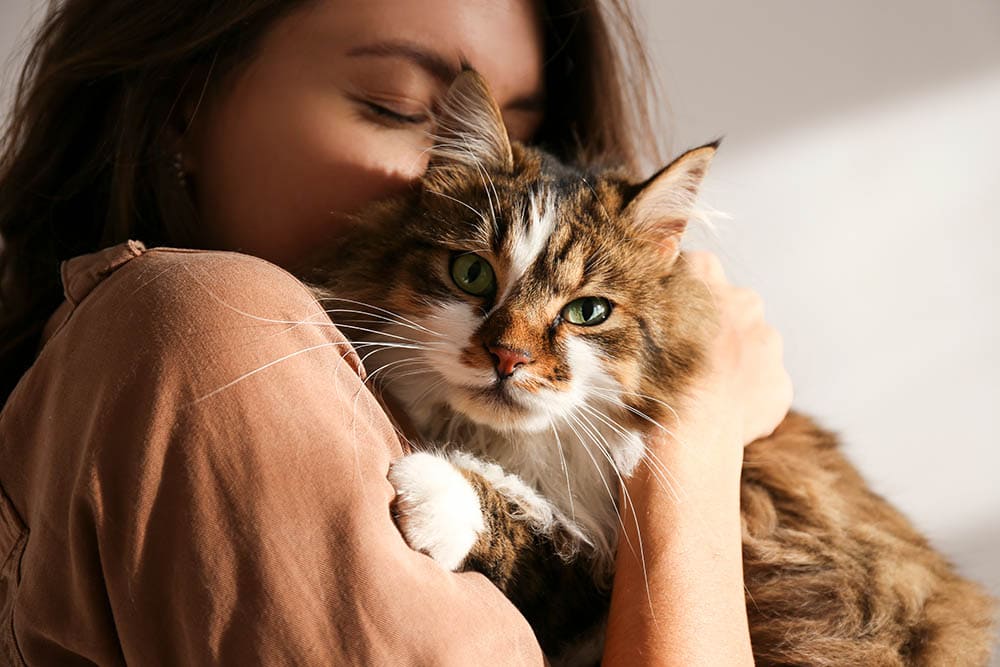
So, you’ve got a furry feline friend and a scaly bearded dragon and you’re wondering if they coexist peacefully. It’s a question that plagues many pet owners who find themselves in this unique situation. To figure out the complex answer, let’s explore the dynamics between a cat and a bearded dragon. But if you need the answer now, the answer is maybe (but with extreme caution)!
Can Cats and Bearded Dragons Get Along?
At first glance, it might seem like an odd pairing. One is a sleek, agile predator, while the other is a slow-moving, armored reptile. Yet, in the realm of pets, the unexpected often happens. Some cats and bearded dragons have managed to strike up surprising friendships, even though they come from entirely different worlds.
Cats, known for their natural hunting instincts, may initially view a bearded dragon as prey. The dragon’s slow movements might trigger your cat’s inner hunter. However, with time and careful introduction, some cats may learn that the bearded dragon is not a tasty morsel but rather a fellow inhabitant of their home. However, there is no way of knowing if your cat will get along with your bearded dragon and examples of these pets coexisting on social media or the internet should not be assumed as the norm.
In addition, regardless of how they behave with each other, it is never okay to leave your cat and bearded dragon together unsupervised.

The Perils of Unsupervised Encounters
While there are heartwarming stories of cats and bearded dragons cohabiting peacefully, it’s crucial to understand the potential dangers. Leaving your bearded dragon alone with your cat can lead to disaster. Cats, being territorial and instinctual hunters, may see your dragon as a target. The result? An unfortunate accident that can harm or even kill your scaly companion.
Bearded dragons, although armored, are not invincible. A curious cat may attempt to swat or play with your dragon, causing stress or injury. To reiterate, avoid these situations, and always supervise their interactions.
It is important to remember that whenever cats play, they are actually hunting – not playing. The term “play” is a human description of the cat’s behavior, but not a true representation of the cat’s actions.
What to Do When Your Cat Scratches Your Bearded Dragon
Accidents happen, and your cat might scratch your bearded dragon despite your best efforts. If this occurs, it’s essential to act promptly. Because bearded dragons can easily get infections from the scratch, it is important to seek veterinary care for them, no matter how inconspicuous the scratch appears to you. It is important to keep in mind that, bearded dragons, alongside other captive reptiles, can easily get injured even from live prey, and therefore, a cat is more than capable of inflicting a wound that requires veterinary care.

The Bite Factor
Cat saliva contains tons of bacteria that can be harmful to reptiles. If your cat licks or nibbles your dragon, it can lead to health issues for your bearded dragon, particularly if they have micro cuts on their skin, or when their skin is somewhat vulnerable (such as before or immediately after a shed). Therefore, it’s crucial to prevent direct contact between your cat’s saliva and your bearded dragon.
The Sociability Factor
Above all, it is important to note that, intrinsically, neither cats nor bearded dragons have a strong desire for interaction with other species, and in some cases, with their own conspecifics too. These animals don’t “miss out” by not forming a bond with other pets, and while they do enjoy interacting with their humans, they will not develop any issues from being kept apart. Your bearded dragon can be secure in their enclosure while you interact with your cat, and likewise, your cat can be elsewhere when you interact with your dragon. Doing so will not harm either animal and is likely the most sensible course of action.

The Dragon Factor
Your cat isn’t entirely risk-free when they interact with your bearded dragon, either. Though many people believe that bearded dragons are venomous (species kept as pets aren’t), they can nonetheless still bite and injure your cat. The Eastern Bearded Dragon (Pogona barbata), which is usually not found in the pet trade, does indeed possess a vestigial venom. However, its efficacy on cats hasn’t been researched. Their venom is not considered a health hazard for humans.
In Conclusion
In the grand experiment of introducing a bearded dragon to a cat, the outcome is uncertain. While some cats may peacefully coexist with these scaly companions, others may not be as tolerant. It’s crucial to exercise patience and caution when facilitating their interactions. Supervision is key to ensuring the safety and well-being of both your cat and your bearded dragon.
Remember, each pet has its unique personality and temperament. By understanding their needs and potential risks, you can attempt to foster a harmonious environment where your furry and scaly friends can thrive together. So, keep a watchful eye, provide a secure habitat, and allow time for them to adjust to each other’s presence.
With care and attention, it’s hypothetically possible for your cat and bearded dragon to share their home peacefully. But remember, supervision is always necessary when these two are in the same room. And more importantly, they aren’t being deprived of anything if they’re kept apart from each other – which is always the best option when these species are involved.
See also:
- Dogs and Cats Living Together: Vet Advice for a Harmonious Relationship
- Do Cats Attack and Eat Rabbits? Facts & FAQ
Featured Image Credit: Stepan Popov, Shutterstock







